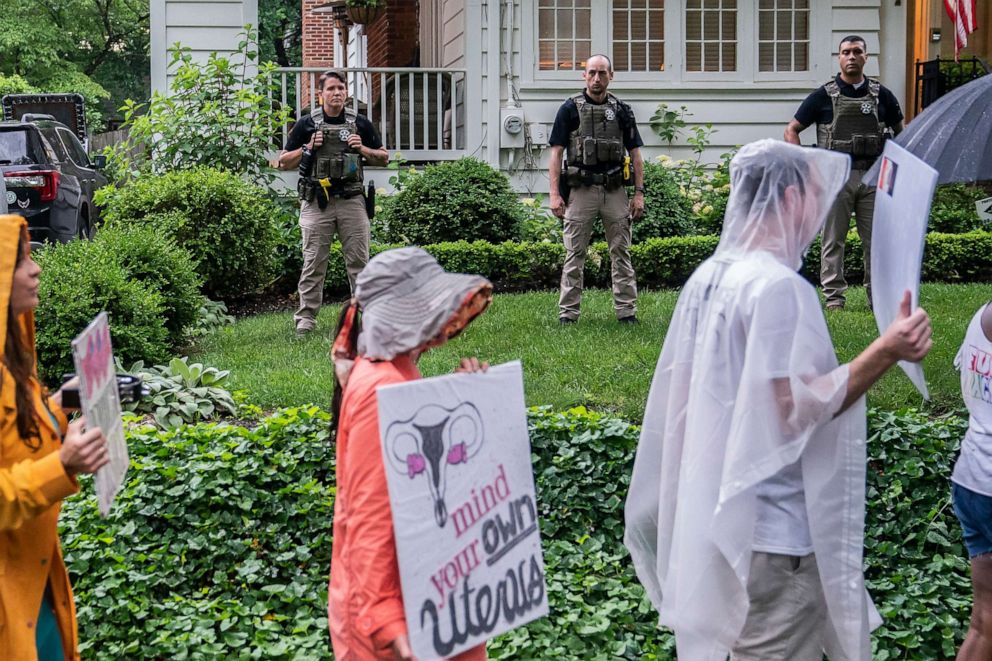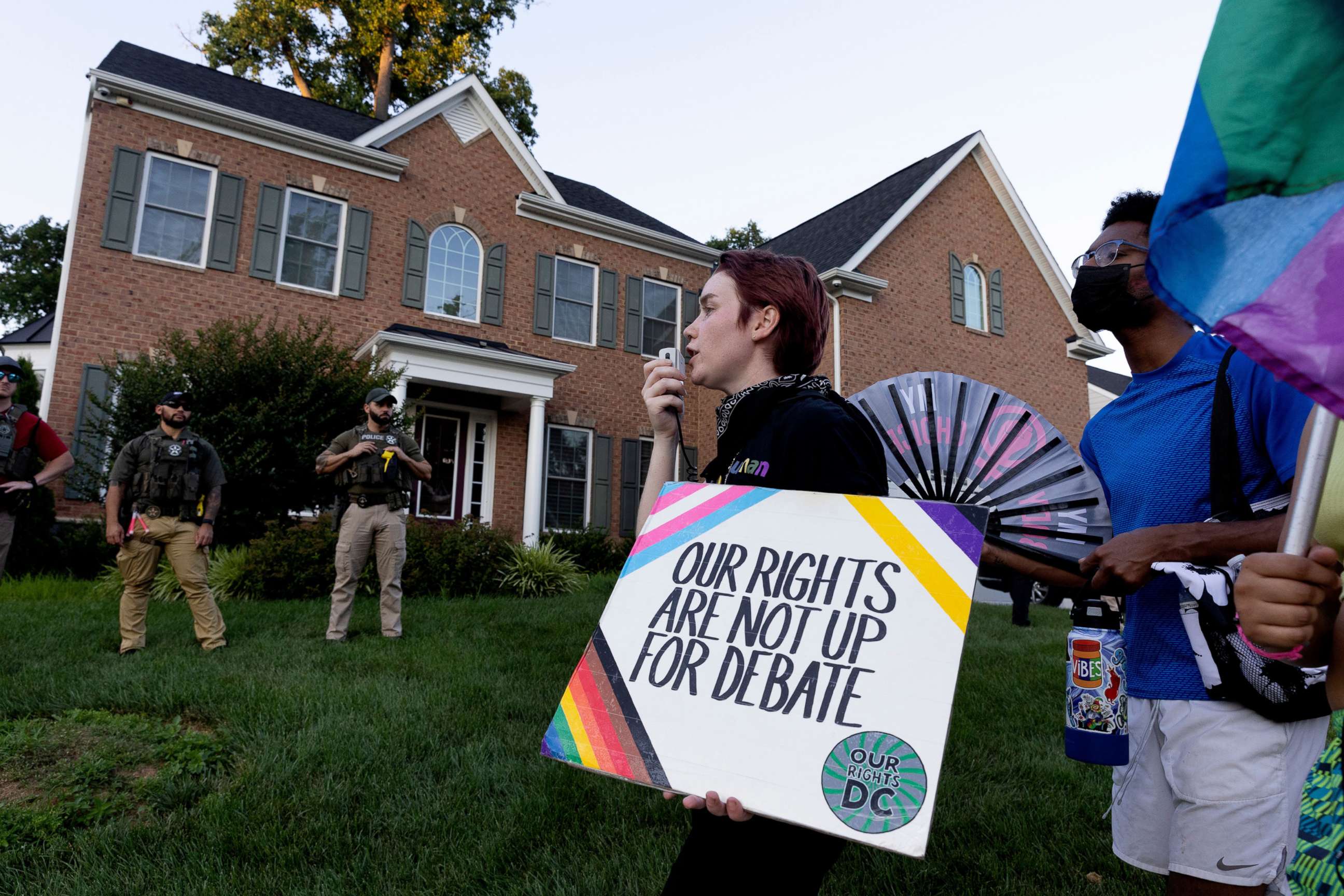Supreme Court marshal asks state officials to prohibit picketing outside justices' homes
Security has increased for the justices since the abortion ruling was leaked.
Supreme Court marshal Gail Curley is asking Maryland and Virginia officials to enforce state and local laws that prohibit picketing outside the homes of justices.
Curley sent the requests to Maryland Gov. Larry Hogan and Montgomery County executive Mark Erlich in letters dated July 1, citing an uptick in demonstrations since May -- when the draft opinion overturning Roe v. Wade was leaked to the public.
"For weeks on end, large groups of protesters chanting slogans, using bullhorns, and banging drums have picketed Justices' homes in Maryland," Curley wrote to Hogan, noting one crowd outside the home of a justice grew to more than 100 people.
The Maryland residences of Chief Justice John Roberts and Justices Samuel Alito and Brett Kavanaugh have been the site of such activity. Alito and Kavanaugh were part of the majority opinion overturning Roe on June 24.

Last month, a man was arrested outside Kavanaugh's home with a gun. Nicholas Roske, 26, allegedly told authorities he intended to kill the justice. Roske has pleaded not guilty to one count of attempting to kill a justice of the United States.
Curley in her letters pointed to a Maryland law which states a "person may not intentionally assemble with another in a manner that disrupts a person's right to tranquility in the person's home." The law provides imprisonment for up to 90 days or a $100 fine.
Curley also cited a Montgomery County law that states a "person or group of persons must not picket in front of or adjacent to any private residence."
As the Supreme Court marshal, Curley oversees security and the court's police force.
Curley noted that Hogan previously said he was "deeply concerned" when hundreds of people gathered to protest at the justices' homes. In mid-May, Hogan joined fellow Republican governor, Virginia's Glenn Youngkin, in urging U.S. Attorney General Merrick Garland to enforce a federal law that forbids demonstrations intended to sway judges on pending cases. In Virginia, the home of Justice Amy Coney Barrett has also been a target of protesters.
Hogan's communications director Michael Ricci pointed ABC News to his statement on Curley's letter when asked for comment Saturday.
"Two months ago, Governor Hogan and Governor Youngkin sent a letter calling on Attorney General Garland to enforce the clear and unambiguous federal statutes on the books that prohibit picketing at judges' residences," Ricci said. "A month later, hours after an assassination attempt on Justice Kavanaugh, the Department of Justice finally responded, declining to enforce the laws."
"Now a different federal official is writing to us with conflicting information," Ricci continued. "Has the marshal taken time to explore the matter, she would have learned that the constitutionality of the statute cited in her letter has been questioned by the Maryland Attorney General's Office."
Ricci said Hogan has directed the Maryland State Police to further review enforcement actions that "respect the First Amendment and the Constitution."
Elrich previously told ABC affiliate WCTI that he wished the protests were done somewhere else. "If everybody's going to protest everybody who does something at their houses, we're going to have a very hard time maintaining civil society," he said, as Curley noted in her letter.
Elrich's office did not immediately respond to a request for comment by ABC News.

On Saturday, Curley sent similar letters to Gov. Youngkin and Fairfax County Board chairman Jeff McKay asking they also take steps to prohibit protests outside the homes of justices.
Curley cited a Virginia statute that states anyone "picketing before or about the residence or dwelling place of any individual, or who shall assemble with another person or persons in a manner which disrupts or threatens to disrupt any individual's right to tranquility in his home, shall be guilty of a class 3 misdemeanor."
Youngkin's office did not immediately respond to a request for comment by ABC News.
"Our office is in receipt of a letter from the Marshal of the Court concerning protesters in front of Supreme Court justices' homes and a possibly related Virginia statute. The County's stance on this issue is unchanged," Fairfax County Chairman Jeff McKay said in a statement. "The law cited in the letter is a likely violation of the First Amendment, and a previous court case refused to enforce it. As long as individuals are assembling on public property and not blocking access to private residences, they are permitted to be there."
Security has been tightened for the justices and their families since the draft abortion ruling was leaked on May 2, and the protests have been the topic of legal debate as protesters argue they are exercising their First Amendment rights.
Curley is also investigating the leak of the draft opinion. Little details have been provided about the probe, but it will likely look at the document's paper trail, as draft opinions are not widely accessible.
The high court just ended a dramatic and divisive term, ruling on hot-button topics like abortion, gun rights, religious liberty and environmental regulation.
The justices will reconvene in October for a term that will include cases on election laws, free speech and consideration of race in college admissions processes.




